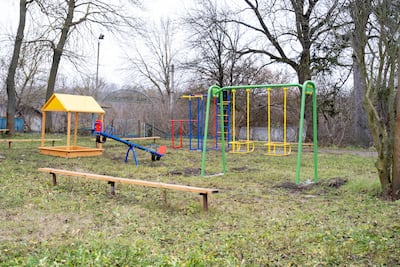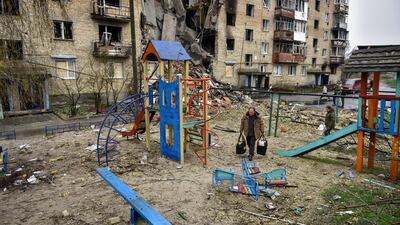Sand pits, swings and climbing frames have rarely been high on President Volodymyr Zelenskyy’s shopping list when he asks Ukraine’s allies for military and humanitarian aid.
But for some Ukrainian children, playgrounds are a part of everyday life that has been missing after Russia’s drone and missile barrage took out even the most mundane civilian structures.
In a town near Lyman, young boys were playing in the shadow of the war next to a school destroyed by rockets, said Brock Bierman, the head of a US aid foundation, who has made several trips to Ukraine.
Mr Bierman, a former official at the US Agency for International Development, said the boys in eastern Ukraine had told him that they would not leave despite Russia’s drive to capture land.
“These three young boys were playing, and just kind of socialising, outside the school. The school had been completely and totally destroyed,” Mr Bierman told The National.
“Every window was destroyed, you could see that it had been blasted by rockets. And yet they were there, socialising in what was obviously an area that was under attack.
“I approached them and I asked them what they felt about the war, and they said, ‘look, we're going to be here as long as it takes, our parents, our community, we're not going anywhere’.”
Officials say playgrounds have been hit by relentless Russian attacks during autumn and winter that have battered Ukrainian cities.
Ukraine’s first lady, Olena Zelenska, told the World Economic Forum in Davos that some children were doing their schoolwork by candlelight after missile strikes knocked out power.
One kindergarten was at the centre of the helicopter disaster that killed Ukraine’s Interior Minister on Wednesday, a crash in which several children died.
As Ukrainians try to repair the damage, aid workers for Mr Bierman’s Ukraine Friends Foundation have built new playgrounds in the west of the country, he said.
One playground costs $2,500 and is typically used by children displaced from the war’s front line in eastern Ukraine.
Aid workers hope it will be a respite for children living through the horrors of war, in which many people have seen homes destroyed by the fighting.
When Mr Bierman visited the village of Moshchun, near Kyiv, it was difficult to find “a single building or structure that hasn’t been completely destroyed or riddled with bullets”, he said.
“When you look around, the house has been levelled, people are living in basements, basically, with tarps over their roofs,” he said. “Right now, I can’t even imagine how they are struggling through winter because of the infrastructure problems and just the lack of electricity or any kind of heating.
“At the end of the day, some of these places are completely destroyed.”
Mr Bierman's aid workers have driven 90 ambulances into Ukraine, brought tens of thousands of first-aid kits, delivered clothing and helped rebuild schools and community centres to restore some normality to Ukraine.
The World Bank estimates that the costs of recovery and reconstruction could amount to $349 billion, a sum bigger than Ukraine’s prewar economy.
The picture is particularly dire in eastern areas such as Kharkiv and Bakhmut, where Ukraine has been pushing to recapture territory but where the fighting has left visible scars.
Analysts say Russia may have deliberately attacked dairy farms near Kharkiv, in another blow to Ukraine’s agricultural exports.
Mr Bierman was in Kharkiv on one of his aid missions and said “building after building” had been destroyed by shelling, making the daily hardship all the greater.
“As we went into areas like Bakhmut, you can see the terror on people’s faces. The farther east you go, the more frightening and horrific it is,” he said.
While many women and children have left Ukraine for countries such as Poland, millions of others are displaced within the country — while others are trapped in their hometowns.
It means that many of those in the west are having to look after refugees from the east even as they battle with the problems facing the whole country.

But people from the front line have been met with hospitality and a remarkable “sense of community that Ukrainians have, coming together”, Mr Bierman said.
Ukraine alleges that children have been abducted from occupied lands in the east and put up for adoption in Russia.
The Kremlin’s goal is to make them forget their identity and loosen the hold of Ukrainian patriotism, Ukraine claims.
There have been numerous reports of Russian agents distributing propaganda in occupied areas, through television, radio and pamphlets.
Mr Bierman said the children he saw were curious to meet a real-life American after hearing tales of their villainy from Russia.
“They said that they had been filled with all of these images from Russian propaganda as to how evil the Americans and Nato and the allies and the western Europeans were,” he said.
“They were just so happy to see me. They wanted a photograph taken with me.
“And they were just amazing young men. They gave me a lot of inspiration and hope for the future of this country.”


